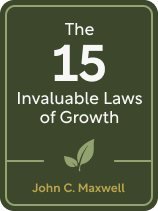

This article is an excerpt from the Shortform book guide to "The 15 Invaluable Laws of Growth" by John C. Maxwell. Shortform has the world's best summaries and analyses of books you should be reading.
Like this article? Sign up for a free trial here.
What life goal should be your first priority? Do you schedule time for personal growth? Who’s your mentor?
In The 15 Invaluable Laws of Growth, John C. Maxwell argues that personal growth is key to a successful, fulfilling life. It enables you to realize your potential. He discusses the themes of character building, self-awareness, self-worth, intentionality, and lifelong learning.
Keep reading for an overview of this practical and inspiring book.
The 15 Invaluable Laws of Growth by John C. Maxwell
In The 15 Invaluable Laws of Growth, John C. Maxwell—a personal growth and leadership consultant—offers 15 guiding principles for personal growth, based largely on lessons he learned from his career. Maxwell started out as a pastor and soon discovered that his calling is helping others grow. This led him to become an author and motivational speaker, and he has since founded several organizations that promote leadership.
We’ve synthesized Maxwell’s 15 laws of growth into five main principles:
- In Principle 1: Prioritize Character Building, we explore the importance of building character before you pursue personal growth.
- In Principle 2: Know Yourself, See Value in Yourself, we discuss the role of self-knowledge and self-worth in personal growth.
- In Principle 3: Commit to Growth, we describe the necessary step of making a commitment to grow.
- In Principle 4: Take Thoughtful Action, we explain how to take thoughtful action toward your goals by planning strategically and consistently following through on those plans.
- In Principle 5: Become a Lifelong Learner, we discuss the value of becoming a lifelong learner—someone who is perpetually committed to growth.
Principle 1: Prioritize Character Building
Maxwell claims that the foundation of personal growth is good, strong character. By his definition, having “good, strong character” means that you embody three universally-valued traits: honesty, integrity, and generosity. Additionally, you’ll consistently act in accordance with these values, even when it’s inconvenient or challenging. According to Maxwell, everyone should prioritize building character over all other goals.
Why Building Character Helps You Grow
Maxwell emphasizes building character not only because it ensures that you achieve your potential—the ultimate goal of personal growth—but also because it maximizes your potential. Let’s explore how strong character contributes to each of these outcomes.
Strong Character Ensures That You Achieve Your Potential
As you pursue goals in different parts of your life, you’ll find yourself in some novel situations—you’ll meet new people, take on new challenges, and try new things. According to Maxwell, having good, strong character will ensure your success in these situations because demonstrating honesty will make people respect you, acting with integrity will show people that you hold yourself to a high standard of behavior, and showing generosity by treating people well will make people want to collaborate with you.
If you consistently act in accordance with these values, people will find you more dependable and trustworthy, which will help you connect with people in your life who can help you achieve your goals.
On the other hand, if you have bad or weak character, Maxwell says, you’ll be more susceptible to failure because you’ll disregard your values when making decisions. If you see an easy way out of a dilemma, you’ll take it, even if it’s unethical. This might benefit you in the short term, but in the long run, it can set you back. For example, if you own a business, cutting corners might help you turn profits, but it could also ruin your reputation.
Character Building Maximizes Your Potential
Since character determines what you’re capable of achieving, prioritizing the strength of your character can empower you to reach new heights. If you improve your character, and therefore your moral integrity, Maxwell says you’ll get better at intentionally living out your values with relative ease. In turn, you’ll be able to make steadier progress toward your goals.
According to Maxwell, If you develop excellent character, you might be able to make powerful, positive changes in the world and act as living proof of the benefits of personal growth—and since having excellent character means being very generous, you’ll feel compelled to help others grow, too. Maxwell believes that demonstrating excellent character makes the world a better place, one of the primary benefits of personal growth.
How to Make Character-Building a Priority
Maxwell suggests two mindsets that will help you prioritize character-building: First, continually seek opportunities to serve others. Second, consciously act in alignment with your values.
Principle 2: Know Yourself, & See Value in Yourself
Maxwell says that in addition to strong character, there are two vital competencies to have before you can grow:
- Self-knowledge: an understanding of your values, passions, and capabilities
- Self-worth: a belief that you’re both worthy and capable of reaching your potential
Why Self-Knowledge Helps You Grow
According to Maxwell, self-knowledge helps you grow because it enables you to think realistically about what your potential looks like. Once you understand your values, passions, and abilities, you can weigh them against each other and use them to pinpoint realistic, achievable goals.
It’s important to have realistic goals for two reasons: First, they make it possible to create a personal growth journey that’s both accurate to and possible for who you are. Second, they give you a clear target—if you don’t know what your potential looks like, it’s hard to determine whether the steps you’re taking are in the right direction. Maxwell notes that the lack of a clear target can cause you to waste time pursuing a goal that you think is your life purpose but isn’t right for you.
Why Self-Worth Helps You Grow
According to Maxwell, self-worth empowers you to achieve your goals—it helps you know your worth, motivating you to invest in yourself. You’ll see the value in opportunities to better yourself, and you’ll be more inclined to go after them. Self-worth also naturally translates into self-confidence, which helps you overcome self-doubt and see your opportunities through.
How to Cultivate Self-Knowledge and Self-Worth
We’ve covered why self-knowledge and self-worth are essential to personal growth, as they’re responsible for your ability to create and pursue achievable goals. Now, let’s explore how you can cultivate each of these skills.
Develop Self-Knowledge: Explore Who You Are
To get to know yourself better, Maxwell suggests you brainstorm to determine your interests and abilities. First, define your values, talents, and passions. Then, determine what you’re realistically capable of achieving.
Develop Self-Worth: Practice Self-Esteem Boosters
If you struggle to know your worth or to feel confident in yourself, Maxwell recommends a couple of practices for bolstering self-worth. First, take pride in your character and previous achievements. Second, practice positive self-talk.
Principle 3: Commit to Growth
Once you’ve developed the foundational mindset needed to pursue personal growth, Maxwell says it’s time to take the next step of committing to growth. In the context of personal growth, commitment means setting an intention to reach your potential—and, crucially, following through on that intention by making the changes and seeking out the opportunities that will get you there.
Why Making a Commitment Helps You Grow
Maxwell argues that making a commitment is necessary because growth can only happen intentionally—not accidentally. Many people make the mistake of expecting to grow automatically throughout their lives. Because of this, they never intentionally improve themselves; then, they wind up dissatisfied with how their lives turn out.
How to Make a Commitment to Grow
Maxwell doesn’t just encourage commitment—he encourages making a commitment to growth today because the longer you procrastinate, the less likely you are to do it. Here are three ways you can cement your commitment and avoid procrastination:
- Evaluate your excuses. If you don’t feel ready to commit to growth, a good place to start is to evaluate your excuses.
- Schedule time to grow. Once you have an intention in mind, you must set it in stone and give yourself time to follow through on it. That’s why Maxwell suggests assigning time in your schedule every day, for at least a year, that you’ll devote to pursuing your personal growth-related goals.
- Make your first move. Today, find a way to make immediate progress toward achieving one of your goals.
Principle 4: Take Thoughtful Action
Making a commitment to your growth and taking the first steps to follow through on that commitment is a launching point for your personal growth journey. From there, to reach your potential, Maxwell says you’ll have to act on that commitment over the long term by taking thoughtful action. This means planning challenges and opportunities for improvement in your life—and consistently rising to meet them.
Why Taking Thoughtful Action Helps You Grow
Thoughtful action has two components: strategy and consistent follow-through. First, you’ll strategically plan the course of action you’ll take to progress toward your goals. Then, you’ll consistently follow through on your plans by making a daily habit of pursuing your goals. Let’s explore how each of these components contributes to growth.
The strategic planning component of thoughtful action helps you grow because it helps you be more productive. The consistent follow-through component of thoughtful action helps you grow because it involves making a concrete, consistent effort to accomplish your goals.
How to Take Consistent Thoughtful Action
Now that we’ve explained how thoughtful action can help you make progress toward your goals, we’ll share some of Maxwell’s tips for ensuring that your thoughtful action is both maximally productive and consistent.
- Make short-term sacrifices. Maxwell argues that, when you take thoughtful action, you must be willing to make short-term sacrifices to achieve long-term goals. He says that every decision you make has an opportunity cost—to succeed, you have to make smart choices about what you’re willing to lose now in order to win later.
- Set yourself up for success. When you’re thinking about how to reach a given goal, Maxwell recommends that you allow yourself twice the time, energy, and resources you think you’ll need. This practice gives you extra room for any challenges you may encounter on your way to the goal, so you’ll be more able to overcome them and, therefore, more likely to succeed.
- Stay motivated. Maxwell says that, if you keep yourself consistently motivated to accomplish your goals, you’ll find it easier to take steady, thoughtful action. He suggests two ways to increase your motivation:
- Come up with as many “whys” as you can.
- Be accountable to yourself and others.
- Practice self-discipline. According to Maxwell, if you want to take thoughtful action consistently, you’ll have to practice self-discipline: following through on your intentions, no matter how tempted you are to do otherwise. This can help you be more consistent by enabling you to overcome the occasional bout of low motivation—you’ll keep moving forward even when you don’t particularly feel like it. To develop your self-discipline, Maxwell says you should train yourself to pursue growth habitually.
Principle 5: Become a Lifelong Learner
At this point, you’ve learned the skills and strategies you’ll need to move toward your potential. But according to Maxwell, no matter how successful you become, it’s vital to never stop growing—which requires a lifelong commitment to learning from your experiences. Ideally, throughout your entire life, you’ll continue to approach each new challenge and experience as a learning opportunity—gaining new tools, skills, and insights along the way.
Why Continual Learning Optimizes Growth
Maxwell says that learning contributes to growth in two ways: Learning from the past helps you achieve future success and helps you feel more fulfilled in life.
Learning From the Past Contributes to Future Success
Maxwell argues that you’ll be more successful if you learn from past failures and successes. If you internalize the lessons you learn from the challenges you’ve faced, you can apply them when you take your next steps forward—so instead of making the same old mistakes, you’ll be better prepared to do things right. As a result, you’ll be more likely to achieve each of your goals and, in the long run, realize your potential.
Learning Increases Your Sense of Fulfillment
Maxwell also argues that since it increases your chances of success, learning also maximizes your overall life satisfaction. If you continue to learn and grow for the rest of your life, you’ll set, and reach, increasingly loftier goals, which will help you feel like you’re making the most of your life. According to Maxwell, giving up on learning and the growth that comes with it means settling for a mediocre life.
How to Become a Lifelong Learner
Now that you understand how lifelong learning can help you reach your potential, how exactly should you approach learning in the context of growth? Maxwell has a few recommendations:
- Practice curiosity. Always ask, “Why?” Also, seek out opportunities that are new and unusual to you and be open to diverse perspectives. If you’re open-minded and innovative, you’ll maximize your chances of success because you’ll be able to overcome barriers that would otherwise hold you back.
- Choose good mentors.
- Reflect. First, write down questions that prompt you to think about challenges you’ve faced, rewarding experiences, opportunities for improvement, and what gives your life meaning. Then, write your responses to these questions. Finally, take time to think deeply about your responses, paying special attention to challenges that were painful for you. In pinpointing your painful experiences, make an effort to reframe them as valuable life lessons.

———End of Preview———
Like what you just read? Read the rest of the world's best book summary and analysis of John C. Maxwell's "The 15 Invaluable Laws of Growth" at Shortform.
Here's what you'll find in our full The 15 Invaluable Laws of Growth summary:
- Why personal growth is essential to living a meaningful life
- How to build strong character and live with integrity
- How to envision, commit to, and pursue meaningful goals






